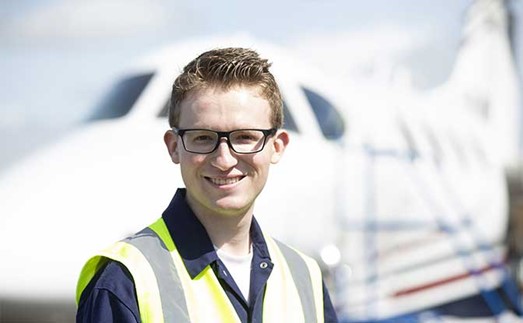
Robert Head
Robert Head | BSc (Hons) Aircraft Maintenance Engineering degree

Robert Head
Robert chose to study at Newcastle College because of its strong reputation for hands-on, industry-focused learning. The Aviation Academy, based at Newcastle International Airport, stood out as it offered essential practical experience in a real hangar environment – something that’s invaluable for anyone looking to enter the aviation industry.
Why did you choose to study at Newcastle College?
I chose to study at Newcastle College because of its strong reputation for hands-on, industry-focused learning. The Aviation Academy, based at Newcastle International Airport, stood out to me as it offered essential practical experience in a real hangar environment – something that’s invaluable for anyone looking to enter the aviation industry.
Beyond the facilities, I was drawn to the supportive learning environment and the opportunity to learn from lecturers with real-world aircraft maintenance experience. Their insights, combined with practical experience on actual training aircraft, provided a solid foundation that helped me transition seamlessly into my career.
Newcastle College was the perfect choice for me because it didn’t just focus on academic knowledge but also equipped me with the technical skills and problem-solving mindset that I use every day in my role.
What did you enjoy most about your time here? Do you have a favourite or standout memory?
What I enjoyed most about my time at Newcastle College was the hands-on learning and the strong sense of teamwork among my peers. The Aviation Academy was an environment where we weren’t just studying theory – we were applying it directly on real aircraft, which made learning both engaging and rewarding.
One standout memory was a warm, sunny day when our year group had the opportunity to work on the newly acquired Beechcraft Premier 1 (a light business jet). We carried out practice maintenance tasks and even came together as a team to move and clean the aircraft outside. It was a great experience that merged practical learning with teamwork and reinforced the collaborative nature of the aviation industry.
Can you sum up your time at Newcastle College in three words?
Engaging, learning, rewarding.
Can you give us a brief overview of your working life since leaving Newcastle College
From a young age, I’ve been passionate about aviation and the wider industry. After graduating in 2023, I began my career as an engineer at Boeing, where I develop, verify, and revise aircraft maintenance manuals for the Boeing 737 and 777 aircraft series. These manuals are essential for airline customers, guiding them, step-by-step, through all levels of maintenance, retrofit, and repair of the aircraft’s systems and equipment.
Beyond technical authoring, I also troubleshoot maintenance-related queries from the operators, working directly with end-users to enhance the maintenance procedures and improve safety and operational efficiency. Most recently, I joined a project verifying and validating maintenance procedures for the 777-9, which will support the aircraft’s upcoming ETOPS certification and entry into service.
In addition to my engineering role, I actively contribute to Boeing’s business resource groups, serving as a Community Outreach Lead and European Board Member of the Boeing Asian and Pacific Association. Collaborating with colleagues across the UK, Europe, and beyond, I help drive initiatives that foster professional development and engagement within Boeing’s diverse workforce.
How have the skills you gained at Newcastle College helped you in your professional career?
The experiences and skills I gained at Newcastle College have played a key role in shaping the start of my career. The hands-on experience in the hangar at the Aviation Academy provided a strong foundation in problem-solving and technical analysis – both essential in my role today.
My time at college also helped me develop key skills such as attention to detail, critical thinking, and effective communication – crucial when translating complex technical information into clear, user-friendly content for airline maintenance teams around the world. Additionally, collaborating with peers and engaging in NCUC fellowships strengthened my teamwork and adaptability, which have been vital when working across different departments and regions.
The soft skills I built at Newcastle College have been just as valuable as the technical knowledge, helping me excel in both my engineering role and wider contributions. A big part of this comes down to the Aviation Academy lecturers, whose guidance was instrumental in my learning and development.
What would your advice be for our current students looking to their future careers?
My advice to current students is to stay focused and proactive. The aerospace industry is constantly evolving, so adopting a mindset of continuous learning will put you in good stead. Take full advantage of every hands-on experience, ask questions, and seek mentorship from your lecturers – they have a wealth of insights that can help you connect the dots.
Building a strong foundation in your subject is important, but don’t underestimate the value of soft skills like adaptability, communication, and teamwork. In the workplace, collaborating effectively and conveying ideas clearly is just as impactful as applying your classroom knowledge.
Finally, don’t be afraid to step outside your comfort zone – every experience contributes to your development. Stay curious, stay determined, and embrace the opportunities ahead!